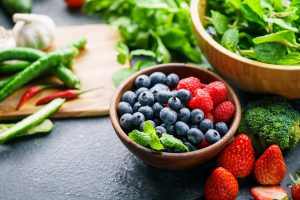Supporting Your Immune Function Through Food By Registered Dietitian, Victoria Cox
by Karen Rollins Mar 1, 2021

Maintaining healthy eating habits during the COVID-19 pandemic can be a struggle especially if you are spending more time than usual in your house.
We asked registered dietitian Victoria Cox, who is based in Barbados, to share her expert advice on what foods you should limit, and which ones promote a well-functioning immune system.
—
As many countries continue to do what they can to control the spread of COVID-19, it is important to reflect on our eating habits, and how they may be affecting our health and immune system.
While no ‘one food’ or supplement can alone ‘boost’ immunity, it is absolutely true that having a healthy diet supports a healthy and well-functioning immune system.
What should we limit?
Currently, it makes sense to stock up on various nonperishable food items, however, we need to carefully examine which ones we choose! Consistently eating large amounts of less-nutritious foods, such as highly processed meat products, “junk foods”, sugary beverages etc., can negatively affect a healthy immune system.
See the suggestions below for some healthier swaps of traditional nonperishable foods.
| Instead of this… | Choose this! |
| Corned beef & luncheon meat | Canned tuna & sardines |
| Hot dogs & sausages | Dried or canned lentils & kidney beans |
| Corn curls & potato chips | Popcorn kernels & unsalted nuts |
| Soft drinks & juice drinks | 100% Fruit cups or canned fruits (not in syrup) |
What should we include?
In terms of our diet, it is ideal to stick to the basics and eat balanced meals, based on a variety of fruits, vegetables, lean proteins, and whole grains.
As we maximise the time between trips to the supermarket, remember that frozen fruits and vegetables are just as nutritious and beneficial for your health as their fresh counterparts, without the worry of them spoiling.
If you choose canned options, which can also work, be sure to rinse vegetables well to remove excess sodium / salt, and avoid fruits canned in heavy syrup.

Aim to include a few servings of fruits and vegetables every single day, if possible. So, for example, have a piece of fruit with breakfast, or throw some mixed vegetables into your rice at lunch, along with a side of some steamed okras, and perhaps have another bit of fruit in the mid-afternoon.
With regards to the mentioned lean proteins, these include options such as chicken, fish (fresh and canned), eggs, lean cuts of pork and beef etc., as well as vegetarian proteins such as soy, lentils, chickpeas, kidney beans etc. Be sure to avoid frying meats, and instead keep them lean by baking, grilling, stewing or boiling.
Similarly, the recommended whole grains include brown rice, quinoa, oats, barley, whole wheat bread / biscuits, and whole wheat pasta. Of course, we can also swap out rice and pasta for the nutritious ground provisions that we are blessed with on Caribbean islands, such as sweet potato, yam, cassava, eddoes etc.
Overall, by limiting highly-processed foods and snacks, focusing instead on balancing all meals with whole grains or ground provisions, lean proteins and vegetables / fruits, we can help our bodies meet their requirements for the vitamins and minerals that optimise the functioning of our immune systems.
This article was written by registered dietitian Victoria Cox.
For more advice and information contact Victoria at (1246) 231-0071 or via her website or email – [email protected].








